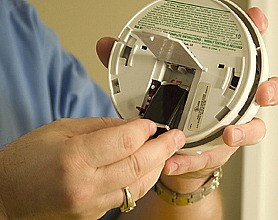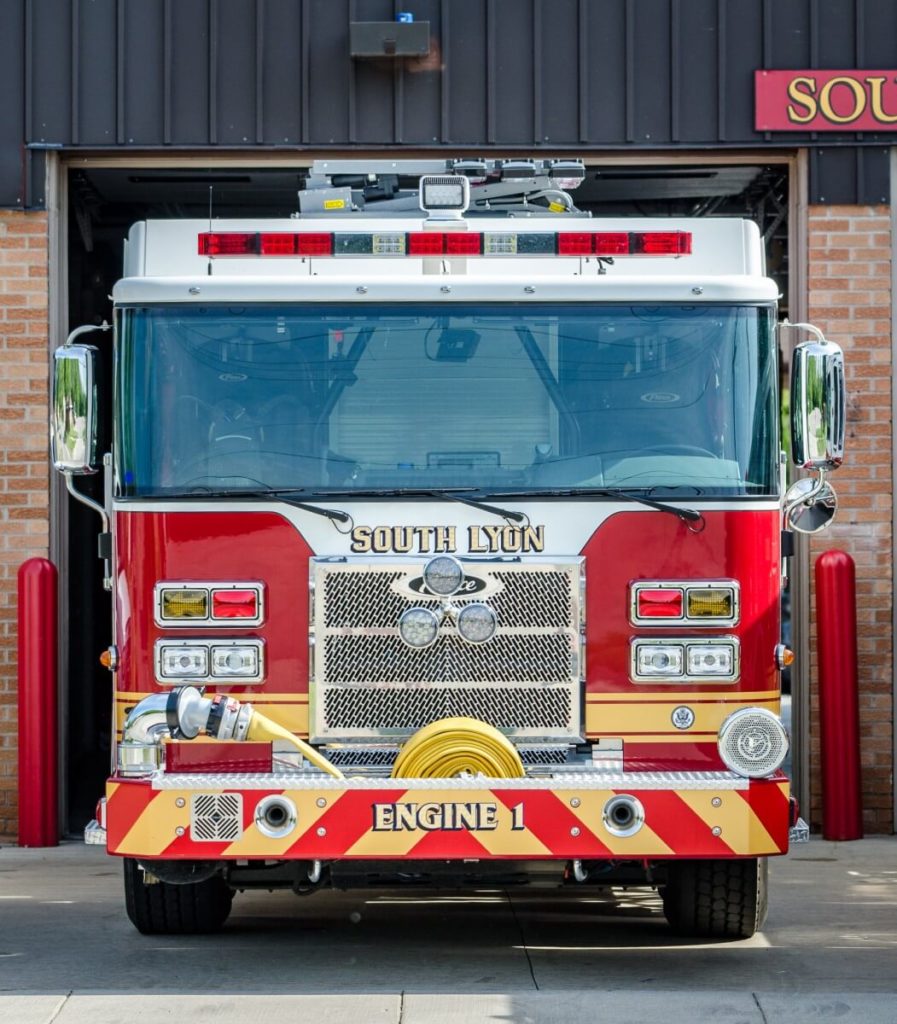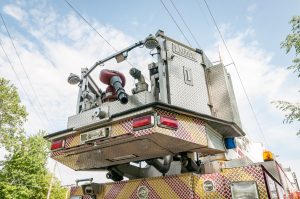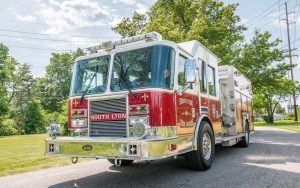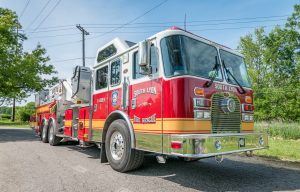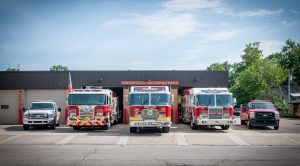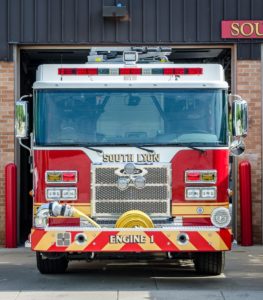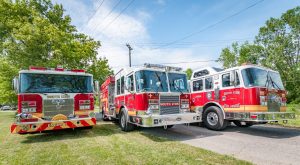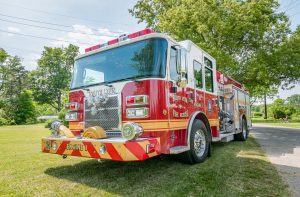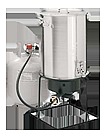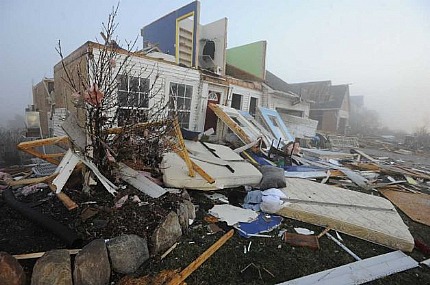Safety Tips
Free Smoke Alarms
SLFD offers free smoke alarm inspection and installation for all city residents. If necessary, we will replace your smoke alarm batteries or install new smoke alarms at no cost. Please call us to schedule an appointment.
It is our department policy not to give away 9-volt batteries or smoke alarms to residents who stop by the fire station. By firefighters installing the 9-volt battery or smoke alarm, we are able to ensure the smoke alarm is installed correctly and is operational.
Non-working smoke alarms rob residents of the protective benefits they are designed to provide. The most commonly cited cause of non-working smoke alarms: worn or missing batteries.
“The peak time for home fire fatalities is between 11 p.m. and 7 a.m. when most families are sleeping,” says Chief Kennedy. “Smoke alarm maintenance is a simple, effective way to reduce home fire deaths. Children and senior citizens are most at risk, and a working smoke alarm can give them the extra seconds they need to get out safely.”
- Install smoke alarms inside every bedroom, outside each sleeping area and on every level of the home, including the basement.
- Larger homes may need additional smoke alarms to provide enough protection.
- For the best protection, interconnect all smoke alarms so when one sounds they all sound.
- Smoke alarms should be installed away from the kitchen to prevent false alarms. Generally, they should be at least 10 feet from a cooking appliance.
- Replace all smoke alarms when they are 10 years old.
Change Your Clock, Change Your Battery
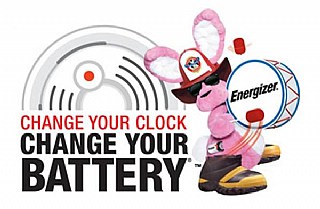 Check your smoke detector battery when you change your clocks. SLFD will conduct a free smoke detectors check for any City resident.
Check your smoke detector battery when you change your clocks. SLFD will conduct a free smoke detectors check for any City resident.
Non-working smoke alarms rob residents of the protective benefits they are designed to provide. The most commonly cited cause of non-working smoke alarms: worn or missing batteries.
“The peak time for home fire fatalities is between 11 p.m. and 7 a.m. when most families are sleeping,” says Chief Kennedy. “Smoke alarm maintenance is a simple, effective way to reduce home fire deaths. Children and senior citizens are most at risk, and a working smoke alarm can give them the extra seconds they need to get out safely.”
Safety Tips
- Install smoke alarms inside every bedroom, outside each sleeping area and on every level of the home, including the basement.
- Larger homes may need additional smoke alarms to provide enough protection.
- For the best protection, interconnect all smoke alarms so when one sounds they all sound.
- Smoke alarms should be installed away from the kitchen to prevent false alarms. Generally, they should be at least 10 feet from a cooking appliance.
- Replace all smoke alarms when they are 10 years old.
Apparatus
Turkey Fryers
- Many units easily tip over, spilling the hot oil from the cooking pot.
- If the cooking pot is overfilled with oil, the oil may spill out of the unit when the turkey is placed into the cooking pot. Oil may hit the burner or flames, causing a fire to engulf the entire unit.
- Partially frozen turkeys placed into the fryer can cause a spillover effect. This too may result in an extensive fire.
- With no thermostat controls, the units also have the potential to overheat the oil to the point of combustion.
- The lid and handles on the sides of the cooking pot get dangerously hot, posing severe burn hazards.
- Important safety information
- If you absolutely must use a turkey fryer, please use the following tips.
- Never use turkey fryers in a garage or on a wooden deck.
- Make sure the fryers are used on a flat surface to reduce accidental tipping.
- Never leave the fryer unattended. Most units do not have thermostat controls. If you do not watch the fryer carefully, the oil will continue to heat until it catches fire.
- Never let children or pets near the fryer even if it is not in use. The oil inside the cooking pot can remain dangerously hot hours after use.
- To avoid oil spillover, do not overfill the fryer.
- Use well-insulated potholders or oven mitts when touching pot or lid handles. If possible, wear safety goggles to protect your eyes from oil splatter.
- Make sure the turkey is completely thawed and be careful with marinades. Oil and water do not mix, and water causes oil to spill over causing a fire or even an explosion hazard.
- The National Turkey Federation (NTF) recommends thawing the turkey in the refrigerator approximately 24 hours for every five pounds in weight.
- Keep an all-purpose fire extinguisher nearby. Never use water to extinguish a grease fire. If the fire is manageable, use your all-purpose fire extinguisher. If the fire increases, immediately call the fire department for help.
Severe Weather
Take Sever Weather Seriously & Prepare
- Heed severe weather watches and warnings. They exist for your safety. As a reminder:
- A Severe Thunderstorm Watch means severe thunderstorms are possible in and around the watch area. Use caution when outdoors, and keep an eye on the sky.
- A Tornado Watch means conditions are favorable for the development of tornado-producing thunderstorms in and around the watch area. A tornado watch provides you with time to prepare in case weather conditions rapidly deteriorate.
- A Severe Thunderstorm Warning means thunderstorms with winds in excess of 58 mph and/or hail larger than 1 inch in diameter are occurring in your immediate area. Take shelter immediately. Severe thunderstorms can and do produce tornadoes.
- A Tornado Warning means a tornado is imminent or already on the ground in your immediate area, indicated by Doppler radar and/or trained weather spotters. Take shelter immediately. THIS IS A LIFE THREATENING SITUATION.
- Obtain a battery-operated NOAA weather radio. NOAA weather radios pick up special messages that are not broadcast on traditional AM or FM frequencies, and they alert to special emergency tones, which can wake you if you are sleeping and a severe weather warning is issued for your area. They can also alert you to other disasters or national security situations. For more information on NOAA Weather Radios, visit: www.nws.noaa.gov/nwr
- Enable Wireless Emergency Alerts (also called Emergency Alerts) on your mobile phone, if your phone supports them. Wireless Emergency Alerts are emergency messages sent by authorized government alerting agencies (such as the National Weather Service) via mobile carriers to all enabled devices within a specific area which may be in harm’s way, without the need to download an app or a subscribe to a service. For more information on Wireless Emergency Alerts, visit www.nws.noaa.gov/com/weatherreadynation/wea.html
- Plan ahead. Make sure everyone in your household knows what to do and where to go in case of a severe thunderstorm or tornado warning. Have a plan in place in case of severe weather. Don’t forget about your pets, and make sure they are always wearing ID.
- Know the safest location for shelter in your home, workplace, and school. Load-bearing walls near the center of the basement or lowest level of the building provide the best protection.
- If you can hear thunder, you are within range to be struck by lightning. Immediately go to the nearest large building, or to a fully enclosed hard-top vehicle (soft-topped convertibles are not safe). It is not safe anywhere outside.
- Telephone lines and metal pipes can conduct electricity. Any item plugged into an electrical outlet can cause a hazard during a thunderstorm or tornado. Do not bathe or take a shower during a thunderstorm. Do not use corded (plug-in) telephones except in an emergency. Cordless telephones (including cell phones) are safe to use.
- Stay away from windows, doors, and outside walls during a severe thunderstorm or tornado warning. Broken glass and wind-blown projectiles cause more injuries and deaths than collapsed buildings. Protect your head with a pillow, blanket, or mattress.
- Do not call 911 to report weather phenomena such as lightning, hail, strong wind, or power outages. Only dial 911 for life-threatening situations and emergencies. Downed power lines, lightning strikes to your home, tornadoes on the ground, injured or trapped persons, structural collapse, fires, natural gas leaks, and flash flooding completely covering the roadway are all storm-related conditions where it is acceptable to call 911.
- After severe weather passes, use extreme caution when venturing out of your home. Downed power lines can be very difficult to see, and are deadly, even at a distance. Unstable trees or structures can collapse, causing injury or death.
- Never attempt to cross a flooded road. A small amount of standing water may look harmless, but flooding causes more deaths than any other form of severe weather. It only takes a few inches of swiftly moving water to knock a person off their feet. As little as 6-12 inches of swiftly moving water can float some vehicles and carry them away.For more weather-related information, including up-to-the-minute watch and warning information, visit the website of the Detroit/Pontiac Office of the National Weather Service at: www.weather.gov/dtx
Grill Safety
Every year Americans look forward to summer vacations, camping, family reunions, picnics, and the Fourth of July. Summertime, however, also brings fires and injuries due to outdoor cooking and recreational fires. Annually, there are almost 3,800 Americans injured by gas or charcoal grill fires. (Source: CPSC)
Summertime should be a time of fun and making happy memories. Knowing a few fire safety tips and following safety instructions will help everyone have a safe summer.
Grill Safety
- Propane and charcoal BBQ grills must only be used outdoors. If used indoors, or in any enclosed spaces such as tents, they pose both a fire hazard and the risk of exposing occupants to toxic gases and potential asphyxiation.
- Position the grill well away from siding, deck railing, and out from under eaves and overhanging branches.
- Place the grill a safe distance from lawn games, play areas, and foot traffic.
- Keep children and pets from the grill area: declare a three-foot “safe zone” around the grill.
- Put out several long-handled grilling tools to give the chef plenty of clearance from heat and flames when cooking.
- Periodically remove grease or fat buildup in trays below the grill so it cannot be ignited by a hot grill.
Charcoal Grills
- Purchase the proper starter fluid and store out of reach of children and away from heat sources.
- Never add charcoal starter fluid when coals or kindling have already been ignited, and never use any flammable or combustible liquid other than charcoal starter fluid to get the fire going.
Propane Grills
- Check the propane cylinder hose for leaks before using it for the first time each year. A light soap and water solution applied to the hose will reveal escaping propane quickly by releasing bubbles.
- If you determined your grill has a gas leak by smell or the soapy bubble test and there is no flame:
- Turn off the propane tank and grill.
- If the leak stops, get the grill serviced by a professional before using it again.
- If the leak does not stop, call the fire department.
- If you smell gas while cooking, immediately get away from the grill and call the fire department. Do not attempt to move the grill.
- All propane cylinders manufactured after April 2002 must have overfill protection devices (OPD). OPDs shut off the flow of propane before capacity is reached, limiting the potential for release of propane gas if the cylinder heats up. OPDs are easily identified by their triangular-shaped hand wheel.
- Use only equipment bearing the mark of an independent testing laboratory. Follow the manufacturers’ instructions on how to set up the grill and maintain it.
- Never store propane cylinders in buildings or garages. If you store a gas grill inside during the winter, disconnect the cylinder and leave it outside.

